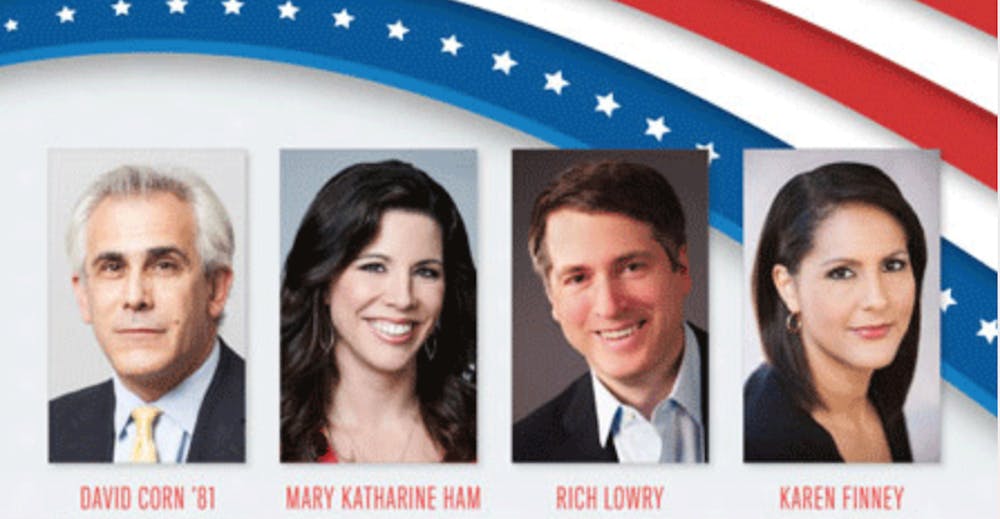Discussion of America’s rapidly changing media landscape alternated between heated arguments and unanimous agreement among panelists at the Joukowsky Forum in the Watson Institute for International and Public Affairs yesterday. The talk, entitled “An Inside Look at Election Coverage,” featured debate on topics ranging from President Trump’s contentious relationship with the press to the media’s coverage of sexual allegations against Supreme Court nominee Brett Kavanaugh.
While the panelists — David Corn ’81, Washington bureau chief for Mother Jones and on-air analyst for MSNBC; Karen Finney, a political commentator and former senior advisor to Hillary Clinton in 2016; Mary Katharine Ham, CNN contributor and senior writer at The Federalist; and Rich Lowry, Fox News commentator and editor of The National Review — represented positions across the political spectrum, all four agreed that Trump’s dishonesty is unlike anything the country has seen from a president before. “It’s pretty remarkable that one fact we can all agree on is that he lies,” Finney said.
“All White Houses have conflict and tension with the media,” Corn added. “Trump does something different than anyone else. That is not just that he has a war on the media — he has a war on truth.”
The Washington Post counted 5,001 false statements made by Trump in the first 18 months of his presidency, Corn said. While previous presidents sometimes made misstatements, “no one comes close to this record,” he said. “It’s hard for the media to cover somebody who says so many things that are untrue.”
Ham agreed that the media is easily distracted by Trump’s actions. “We end up covering whatever it is that he was tweeting instead of talking about policy,” she added. “He has a sort of savant-like ability to get to the press and turn the press into a tool of his in this giant drama that he is creating every day.”
Though Lowry said the press is “openly hostile” to Trump’s presidency, he argued that media outlets benefit from their coverage of Trump. “This is a deeply symbiotic relationship” between Trump and the media, he said. “The press, at the same time it’s outraged by everything he does and says, covers him obsessively and enjoys all the new subscriptions and all the audience ratings that come from this reality show we’re living in.”
Trump has also altered the media’s traditional role as an intermediary between the people and the government, Finney said. “The media and reporters are a channel to get information out,” she said. “In this day and age, we have multiple channels — including Twitter and social media — where you can have a direct line to the president.”
This flow of information — which allows people to engage in immediate and public debate on any topic — is a new feature of the media landscape, Corn said. “It used to just be information in one direction: us to you,” he explained. “Now there is a different dynamic that goes on. It can be painful at times, but ultimately it breaks down the barrier” between citizens, the media and the government.
Lowry sees the increase in different news sources as a positive development. “It used to be that there were three networks where you got your news,” he explained. “They were referred to — somewhat ironically, but seriously — as ‘the voice of God.’ For me, that is not a good media environment. What we have now has downsides, but it’s better.”
The internet also makes primary sources much more publicly accessible than ever before, Ham added. “You can go search out the full video of someone saying something. You can go search out the full transcript,” she said. “That is something we did not have at our disposal not very long ago.”
Because of this access to primary sources, media coverage is less important today, Corn said. Twenty percent of households tuned in to last Thursday’s Senate hearing involving Christine Blasey Ford’s allegations of sexual assault against Kavanaugh, and many more people likely watched the hearing online, he noted. “We can nitpick about things that people have gotten wrong or false narratives, but basically everybody got to see the two primary actors make their best cases and judge for themselves,” he said. “This is all happening so much in the glare of public attention that I think it’s hard for the media to (mess) it up.”
“But they have,” Lowry and Ham both replied. The panelists launched into a lengthy debate on the sexual assault allegations against Kavanaugh that drew some aggravated responses from audience members. Lowry and Ham argued that the media has been unfair in its coverage of Kavanaugh, while Corn and Finney countered that Kavanaugh’s recent and past behavior has broken traditional standards of judicial temperament.
One audience member, Alan Flink ’49, entered the panelists’ debate on Kavanaugh. “This is not a court of law,” he said. “This is not a question of who’s right or who’s wrong. The question should be whether Brett Kavanaugh is an appropriate person to sit on the highest court in the United States.” Flink went on to argue that Kavanaugh’s highly partisan and belligerent behavior in the hearing disqualifies him from the Supreme Court.
Flink told The Herald he was unsurprised that the panel argued extensively over Kavanaugh. But he was surprised that all four panelists “agreed that the president is a consummate liar.”
“Lying can’t be acceptable and shouldn’t be acceptable,” Flink said. “It’s damaging, and it should be subject to the strongest condemnation. It’s unworthy of the United States of America.”





